Hershey Community Gets Involved with Women’s March
March 7, 2017
Just for a day, pink cat hats flooded the streets.
Over one million people attended the Washington, D.C. march, and over five million people marched worldwide. Although people had many causes for marching, they united under the belief of equality. Members of the Hershey community who marched had positive experiences. However, people have different views on the the march’s effect on the advancement of social and political equality. The Women’s March on Washington took place on January 21, 2017.
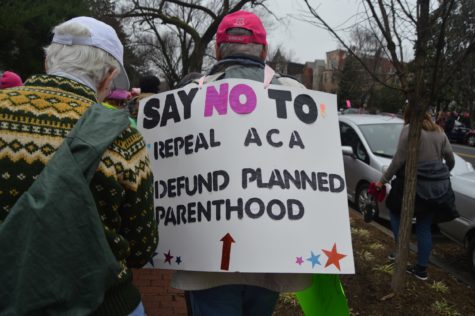
Former HHS teacher Brianna Crowley participated in the march for many reasons. Crowley wanted to send a message to all elected officials that they will be held accountable. “I believe that the person who was elected in November does not have our country’s best interest as a top priority,” Crowley said.
Additionally, Crowley protested to use her rights as a citizen, unify with others, be a part of history, and project her voice. Many voices amplify the power that just one voice may have, according to Crowley.
While in the rally, she felt the exhilaration of being surrounded by fellow citizens that “were there to stand for issues that I care about and stand against policies I believe hurt Americans,” Crowley said. She observed that about 30% of the crowd was males, which furthered the feeling of unity. On a subway full of fellow marchers, Crowley witnessed interactions between strangers cause new relationships to form. People instantly connected over their decision to take the time to attend the march.
Similarly to Crowley, HHS junior Molly Reeves experienced an atmosphere of community at the March on Washington. The positivity and friendliness of fellow marchers around her made her feel like she could talk to anyone. The police officers she spoke to said that the crowd was peaceful. “That’s what I think a protest should be,” Reeves said.
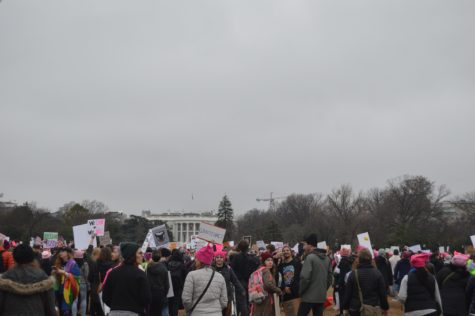
The protest signs and posters fought for different aspects of the same idea: equality. Some signs were humorous, such as ones that directly made fun of Donald Trump’s appearance. Crowley was not as inspired by the humourous signs because she would rather criticize one’s words or actions than appearance. Crowley carried a sign reading “Womanhood: Achieving our full selves by fully embracing each other” to advocate for mutual support among women everywhere.
Some signs were more serious. Reeves saw one that said “My president should not remind me of my rapist,” which was very powerful to her. The sign refers to rape and sexual assault allegations from multiple women against President Trump.
Additionally, Reeves was able to hear some guest speakers, albeit briefly. Both Reeves and Crowley saw Scarlett Johansson while she gave a speech about the importance of women’s health care. One guest speaker whose comments proved to be controversial was Madonna..
Although he does not always agree with the voice’s content, HHS Young Republicans club supervisor David Anderson accepts the idea that exercise of free speech and assembly are important. “Absolutely I support the march,” he said, “It opens up discussion and debate.”
Anderson keeps up with the latest politics from national and local news organizations. He was watching live television coverage of the march when guest speaker Madonna used profanity in her speech. After that, he did not listen anymore. “When that first f-bomb went off, it just delegitimized the whole thing,” he said. Anderson is not alone in his distaste for Madonna’s wording.
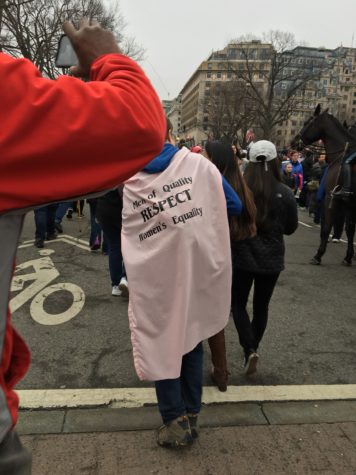
Madonna Ciccone’s speech in context is as follows: “Know that we are not afraid… That there is power in our unity and that no opposing force stands a chance in the face of true solidarity. And to our detractors that insist that this March will never add up to anything, f*** you. F*** you. It is the beginning of much needed change… that will require many of us to make different choices in our lives, but this is the hallmark of revolution.”
Crowley regards people’s outrage at Madonna’s word choice as sexist, and many people take them out of context. Often times, women who swear are demonized more than men who do according to Crowley. “…those criticizing her are doing so most unfairly and also because they were looking for a way to make this historic march less legitimate,” she said.
Because of the prevalence of politics and conflict in today’s society, critics would have found some other way to discredit the march without Madonna, according to Crowley.
Anderson believes that everyone has the right to freedom of assembly, “whether you agree or disagree with [the content of the message],” he said. However, he stopped listening to the march because of strong disagreement to Madonna’s behavior. “Act like an educated decent human being,” he said.
However, many people marched because they are concerned with President Donald Trump’s past and present behavior. “I don’t want his actions to be normalized,” Reeves said. Reeves attended the March on Washington with her mother and sister, and she marched to have her rights represented.
A simple Google search of feminism will show a definition: “the advocacy of women’s rights on the basis of the equality of the sexes.” Reeves agrees with this definition and asserts that it is a necessity. She knows that people associate feminism with a lot of other controversies, but she reckons that it is limited to gender equality. “I believe that we should all be equal, but it’s not like that right now,” Reeves said.
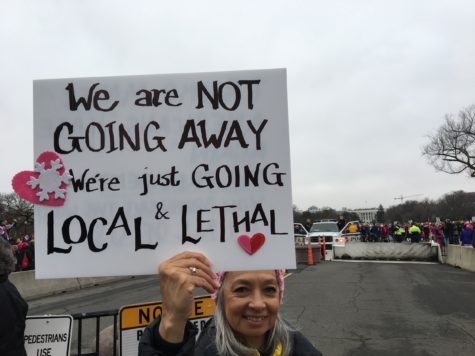
Like Reeves, Crowley feels strongly that work of feminism is needed to combat the lack of female representation in top positions such as CEOS and Congressional seats as well as the lack of mandatory maternity leave, which Crowley believes gives women fewer opportunities to stay financially stable and start a family simultaneously.
Although the idea of male feminists may baffle some, the feminist movement is beneficial to both genders, according to Crowley. “True equality would not disadvantage men in court custody cases. True equality would mean that men who choose to stay home to raise children would feel celebrated, not marginalized and disrespected,” she said.
Contrastingly, Anderson believes that everyone should be treated with respect, honor, and dignity regardless of gender, race, etc. He views today’s debate as lower quality than before due to technological influence. People can hide behind screens and don’t have to defend their point face-to-face with others. “In today’s society, we pretend that we are listening, but we’re just waiting for our turn to talk,” he said.
Based on the protest messages, the march was focused on more than just gender equality. It had representation from many marginalized groups, including LGBTQ+, Muslim, black, Native American, and more. Additionally, both men and women protested the government’s changing involvement in healthcare and reproductive issues.
However, the marchers themselves could have been more inclusive. Crowley had a great personal experience, but she knows that not everyone received as much acceptance. “…despite my feeling of connectedness, there is still work to be done in supporting ALL women and men to feel connected to this movement,” she said, referring to the negative experiences of women of color because white women did not behave as kindly or openly towards them.
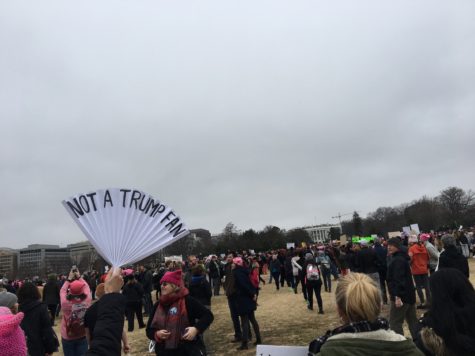
Feminism that does not account for just gender and emphasizes inclusiveness is called intersectional feminism. According to HHS junior Tiffany Walker, feminism is extending past gender and moving towards race and sexuality relations. Walker supports the march’s message, but like Crowley, she is aware that white women silenced women of color’s voices. Walker wants to recognize that while white
women still must break barriers, chances are there is a marginalized group who has much less progress. “It’s possible to be aware of and advocate for multiple issues,” she said.
Now that the march is past, supporters are looking towards the future. Crowley plans to be more politically active, support local community work that unites many kinds of people, and also interact with congressmen/women. Most importantly, she will take opportunities “to dialogue with people who may not agree with me,” Crowley said.

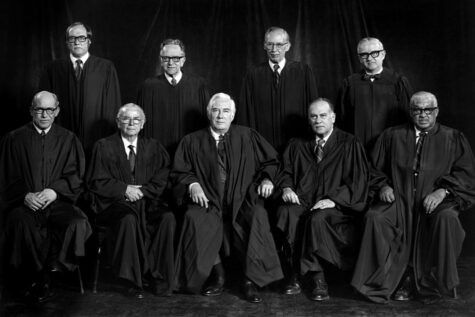

Cristi • Mar 6, 2019 at 12:36 pm
I am quite disappointed to see such an event highlighted especially the references and pictures in regards to planned parenthood. I believe that until you are able to fully teach exactly what something as serious as abortion is, there should be no place for this organization on a school website. Especially in light of the fact that it’s supposed to be about equality and the right to abortion does not include the opinions of potential fathers. It’s about learning, the truths of things. This organized event has been very harshly criticized for its ideological views and for its affiliations! Very disappointing…
Robert Sterner • Apr 15, 2019 at 2:33 pm
With respect, this “school website” is the student-run newspaper. We don’t choose what news happens; we report it.
Cristi • Mar 6, 2019 at 12:25 pm
I am quite disappointed to see such an event highlighted especially the references and pictures in regards to planned parenthood. I believe that until you are able to fully teach exactly something as serious as abortion is, there should be no place for this organization on a school website. It’s about learning, the truths of things. This organized event has been very harshly criticized for its ideological views and for its affiliations! Very disappointing…